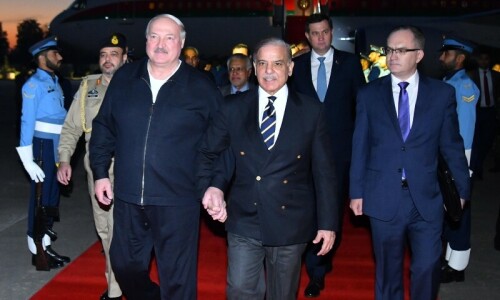PESHAWAR: Twenty-two-year-old Irfan Masih, a resident of Peshawar, is at the city’s historical St Michael Cathedral Church to make arrangements for one of the happiest days of his life — his wedding day.
The young man wants to rent the church’s lawn for the ceremony. The news is met with congratulations from the church administrator, but he also lays out one condition for the gleeful groom-to-be. He is told that no music can be played at the ceremony. This is out of respect for the cathedral’s neighbours — a mosque and madressah known as the Jamia Imdadul Uloom or Darwaish Masjid.
Irfan tries to reason with the administrator. “This is my first and last marriage,” he says in a lighter tone. He is met with a stern response: “If you agree [only] then will the church permit you to entertain guests in the lawn, otherwise we are sorry.”
Working together
The church’s red bricks glisten in the winter sunlight. The structure stands tall next to the whitewashed madressah that was built 38 years ago.
In the often-volatile city of Peshawar, it is a sight to see these two ‘houses of God’ existing alongside one another. Mufti Asad of the madressah says that they have friendly relations with their neighbours. The two places of worship exchange gifts on each other’s religious festivals. Last Eidul Azha, representatives from the church came to the madressah bearing gifts. “We also offered them meat and ate barbeque together,” Mufti Asad says.
These stories of peaceful coexistence are heartening to hear.
Members of Jamia Imdadul Uloom take pride in the madressah’s more “progressive” outlook. Maulana Hassan Jan was a teacher here, who was allegedly the first religious scholar to declare suicide bombings haram. It is believed that these moderate views ruffled some feathers and Maulana Jan paid the ultimate price for this. In 2007, during the Islamic month of Ramazan, he was assassinated.
Many of Maulana Jan’s students are now teachers at the madressah. They claim to be continuing to follow his philosophy of peace and respect for other religions.
In the neighbouring church, Father Younas Riaz is similarly spreading messages of peace. He wears a white robe as he preaches these values to a congregation of devout Christians.
“You shall love your neighbour as yourself,” he says quoting the Bible.
Propagating peace
Peshawar has often been an unsafe place for Christians. A September 2013 suicide attack on the city’s All Saint’s Church killed at least 80 and left 100 wounded. In such a scenario the apparent camaraderie shared by the two places of worship is encouraging.
Attaullah Khan, a researcher, says, “In this country there is always a threat to minorities… they are treated as second-grade citizens since birth…”
Father Younas Riaz of the cathedral says that some “so-called education experts” are systemically facilitating this intolerance in society. “[They] are working to sabotage the unity of this diverse society,” he adds, criticising the textbooks which often perpetuate hate.
Mr Khan agrees, further stating that the media and the textbooks are both culpable for propagating that Muslims are patriots and true lovers of the country, while the “others” are often painted as dubious characters. The “intellectuals” associated with the boards of education deliberately do not give space to non-Muslim heroes and their contributions, he believes.
For their part, however, representatives of the Jamia Imdadul Uloom take pride in their teaching of tolerance and unity. Mufti Asad shares that 1,000 students are enrolled in the seminary, and due to the institution’s teaching methodology none of its students have been found guilty in any anti-state or unlawful activities. Mufti Asad further tells Dawn that they maintain a comprehensive computerised record of all the madressah’s current and ex-students.
In this crucial time, the scholars and intellectuals need to work to shape the youth’s mind, Mr Khan concludes. Representatives of both the places of worship also stress that the mosque and church exist side by side because of the compassion being taught here.
Published in Dawn February 4th, 2017













































Dear visitor, the comments section is undergoing an overhaul and will return soon.